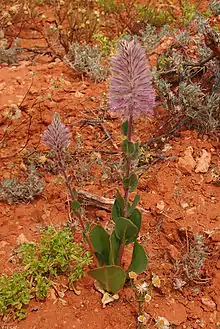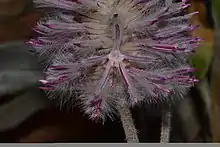Ptilotus exaltatus
Ptilotus exaltatus Nees, also commonly known as the pink mulla mulla[2] or tall mulla mulla,[3] is one of the largest mulla mullas. The species is endemic to much of mainland Australia.
| Ptilotus exaltatus | |
|---|---|
 | |
| Scientific classification | |
| Kingdom: | Plantae |
| Clade: | Tracheophytes |
| Clade: | Angiosperms |
| Clade: | Eudicots |
| Order: | Caryophyllales |
| Family: | Amaranthaceae |
| Genus: | Ptilotus |
| Species: | P. exaltatus |
| Binomial name | |
| Ptilotus exaltatus | |
| Synonyms[1] | |
| |

This robust perennial or ephemeral herb typically grows to a height of 1 metre (3.3 ft) tall[3] but in a good season can grow to 1.5 m (4.9 ft) tall and in poor years it may be only reach a few centimetres in height. There is a basal rosette of spathulate-oblanceolate smooth leaves up to 10 cm long, the stem leaves being shorter. The flower spikes are up to 10 cm long and 4 cm across with loosely hairy flowers. The species is widespread from the North-West coast of Australia east into the Northern Territory, New South Wales, Queensland and south-east to the eastern agricultural districts, Norseman and into South Australia.[4] Ptilotus exaltatus was synonymised with Ptilotus nobilis in 2008,[5] but a study in 2018 has reinstated P. exaltatus as a separate species based on strong morphological and ecological partitioning.[1]
References
- Hammer, Timothy A.; Macintyre, Paul D.; Nge, Francis J.; Davis, Robert W.; Mucina, Ladislav; Thiele, Kevin R. (31 July 2018). "The noble and the exalted: a multidisciplinary approach to resolving a taxonomic controversy within Ptilotus (Amaranthaceae)". Australian Systematic Botany. 31 (3): 262–280. doi:10.1071/SB17062. ISSN 1446-5701. S2CID 92393400.
- Grieve, Brian J. (1998). How to Know Western Australian Wildflowers. Nedlands, Western Australia, Australia: University of Western Australia Press. p. 16. ISBN 1-875560-29-7.
- Margaret G. Corrick, Bruce Alexander Fuhrer (2009). Wildflowers of Southern Western Australia. Rosenburg Publishing. ISBN 9781877058844.
- Erickson, Rica; A. S. George; N. G. Marchant; M. K. Morcombe (1982). Flowers & Plants of Western Australia. Frenchs Forest, NSW, Australia: AH & AW Reed Pty Ltd. p. 146. ISBN 9780589501167.
- Bean, A.R. (2008). "A synopsis of Ptilotus (Amaranthaceae) in eastern Australia" (PDF). Telopea. 12 (2): 227–50. doi:10.7751/telopea20085812. Archived from the original (PDF) on 24 September 2015. Retrieved 14 August 2014.